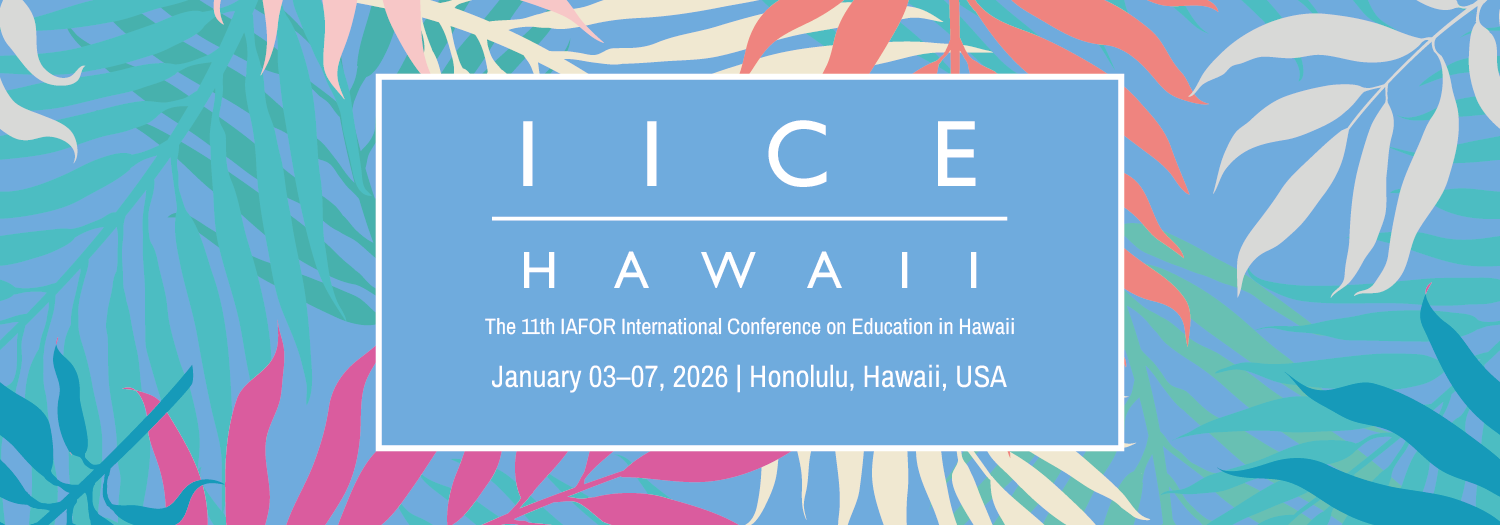The IAFOR International Conference on Education – Hawaii (IICEHawaii) is a multidisciplinary conference held concurrently with The IAFOR International Conference on Arts & Humanities in Hawaii (IICAH). Keynote, Featured and Spotlight Speakers will provide a variety of perspectives from different academic and professional backgrounds. Registration for either of these conferences permits attendance in both.
This page provides details of featured presentations, the conference schedule and other programming. For more information about presenters, please visit the Speakers page.
Conference Outline
Location: Hawaii Convention Center (3F)
12:00-13:00: Conference Check-in & Coffee | Room 306
13:00-13:10: Announcements | 310 Theatre & Online
13:10-13:35: Cultural Presentation | 310 Theatre & Online
13:35-14:00: Welcome Address & Recognition of IAFOR Scholarship Winners | 310 Theatre & Online
14:00-14:30: Keynote Presentation | 310 Theatre & Online
14:30-14:40: Q&A
14:45-15:15: Keynote Presentation | 310 Theatre & Online
15:15-15:25: Q&A
15:25-15:40: Conference Photograph | 310 Theatre
15:40-16:00: Coffee Break
16:00-17:00: Featured Panel Presentation | 310 Theatre & Online
17:00-18:00: Welcome Reception | Room 306 & Pa Kaloka Charlot Courtyard
This is a free event open to all registered delegates
19:00-21:00: Conference Dinner | Roy’s Waikiki
This is an optional ticketed event
Location: Hawaii Convention Center (3F)
08:30-09:30: Conference Check-in
09:00-09:30: IAFOR Information Session | Room 306
09:30-11:10: Onsite Parallel Session 1
11:10-11:25: Coffee Break
11:25-12:25: The Forum | Room 306
12:25-13:55: Extended Break
13:55-15:35: Onsite Parallel Session 2
15:35-15:50: Coffee Break
15:50-17:30: Onsite Parallel Session 3
17:30-18:20: Cultural Event | Room 306
E Hele Mai a Hula: A Hawaiian Music and Dance Workshop
Join us in exploring Hawaiian music and dance led by renowned Hula instructor Auntie Carolee Nishi, a Living Treasure of Hawaii.
This is a free event open to all registered delegates
Location: Ala Moana Hotel (2F)
09:00-09:30: Check-in | Garden Lanai
09:30-11:10: Onsite Parallel Session 1
11:10-11:25: Coffee Break | Garden Lanai
11:25-12:25: Poster Session 1 | Garden Lanai
12:25-12:55: Extended Break
12:55-14:35: Onsite Parallel Session 3
14:35-14:50: Coffee Break | Garden Lanai
14:50-16:30: Onsite Parallel Session 4
Location: Ala Moana Hotel (2F)
09:00-09:30: Check-in | Garden Lanai
09:30-11:10: Onsite Parallel Session 1
11:10-11:25: Coffee Break | Garden Lanai
11:25-12:25: Poster Session 2 | Garden Lanai
12:25-12:55: Extended Break
12:55-14:35: Onsite Parallel Session 3
14:35-14:50: Coffee Break | Garden Lanai
14:50-16:30: Onsite Parallel Session 4
16:35-16:50: Onsite Closing Session | Garden Lanai
Location: Online via Zoom
14:55-15:00: Message from IAFOR
15:00-16:40: Online Parallel Session 1
16:40-16:50: Break
16:50:18:30: Online Parallel Session 2
18:30-18:40: Break
18:40-19:55: Online Parallel Session 3
19:55-20:00: Message from IAFOR
*Please be aware that the above schedule may be subject to change.
Featured Speakers
To be announced
Featured Presentations
To be announced
Important Information Emails
All registered attendees will receive an Important Information email and updates in the run-up to the conference. Please check your email inbox for something from "iafor.org". If you can not find these emails in your normal inbox, it is worth checking in your spam or junk mail folders as many programs filter out emails this way. If these did end up in one of these folders, please add the address to your acceptable senders' folder by whatever method your email program can do this.
Conference Programme & Abstract Book
The Conference Programme contains access information, session information and a detailed day-to-day presentation schedule.
The draft version of the Conference Programme will be available online on November 25, 2025. All registered delegates will be notified of this publication by email.
*Please be aware that the above schedule may be subject to change.
Previous Programming
View details of programming for past IICEHawaii conferences via the links below.
